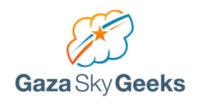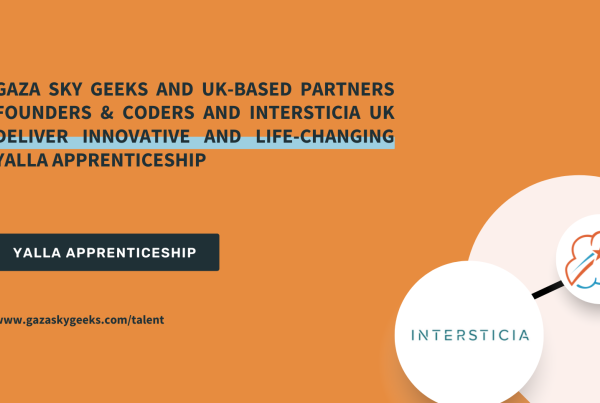Said Hassan is the founder of Tevy, one of the first startups in Gaza, and the outreach and acceleration manager for Gaza Sky Geeks. He is also one of Gaza’s main startup leaders and a beloved member of our community. This blog post by Iliana Montauk weaves together many snippets that Said has shared with her over the course of the past year, bringing him to life so that the world can meet one of the key people shaping Gaza’s startup community.
Leaving Gaza
My family was one of the original refugee families in Gaza. My father was the first United Nations employee. He used to return to Jaffa for work and visit his old family business.
Leaving Gaza wasn’t that easy. People around the world always seem to think that we Gazans are dying to leave Gaza. I love my family and did not want to leave them. I knew that once I left, it would not be easy to see them: I was going through Rafah, the border crossing with Egypt, which is not open reliably. My family would not necessarily be able to come visit me even though I would not be far away.
It wasn’t only due to family that I did not want to leave. Gazans love Gaza. I love Gaza. The culture is hard to describe – it’s a place where everyone has a smile on their face, people are resilient and smart and with a great sense of humor. The beach is beautiful. We have a long history on one of the world’s main trade routes. We have well-known families that have remained over decades and that invest their own resources to maintain Gaza’s traditional culture and roots. We have entrepreneurial youth creating new forms of art. We have a parkour team and breakdancing groups. We have a French Institute and French clubs.
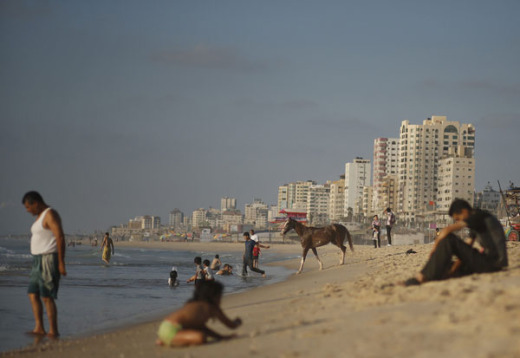
Photo by Mohammed Salem (Reuters blog) 2013.
My home was modest, but I loved it. It was in a refugee camp, which nowadays means it’s a neighborhood with many small homes all close together and poor infrastructure. My room had my artistic scribbles on the walls from when I was a kid – it’s the place I grew up and the place that reminds me who I am. The UNWRA office was right across the street, and nearby was a great basketball court. We had the best basketball team in Gaza.
I left Gaza when I was 18 to study in college in Egypt. I did not realize what a tremendous opportunity that was until I returned. Nowadays when I meet my friends from high school, I’m shocked. The people who were at the top of their class in high school have lost their skills. The top computer engineers barely remember how to write a line of code. There were no opportunities in their field in Gaza so they started working for their families, small subsistence businesses like grocery stores. It’s sad to see the wasted human capital.
Working at a Top Startup
I joined Souq.com when it was still a small company. I was attracted to it because of the co-workers and because of my position: I would be leading its marketing, which is one of my main passions. It was an incredible environment to be a part of because the startup was growing so fast – it was the fastest-growing startup in the Arab world – and because we were all so committed to our work. We had fun there. Sometimes we’d work until 3am and sleep on the couches in the office. We ended up winning regional awards for our marketing campaigns. Souq is where I learned to be a manager and a part of a successful startup. I still stay in touch regularly with the founders.
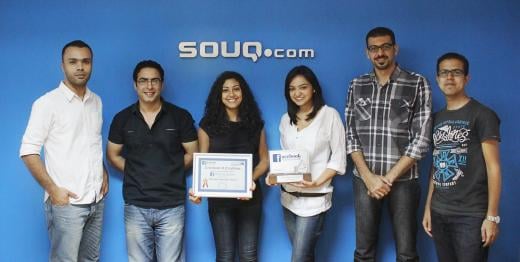
Return to Gaza
I returned to Gaza unexpectedly because my family suddenly needed me. When I came back, I imagined that I’d never be able to work on startups again. To my surprise, I heard about a Startup Weekend that was being organized. It was the third Startup Weekend in Gaza. I showed up and mentored startups there. That’s where I bumped into Gaza Sky Geeks. They were getting ready to launch their accelerator and asked me to join. It was a dream come true!
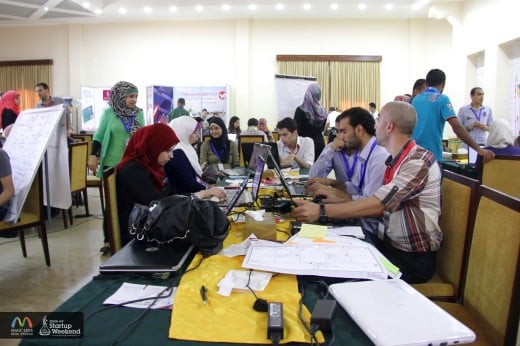
Startups in Gaza
Now at Gaza Sky Geeks, I have the opportunity not only to work on my own startup, but to help tons of youth develop theirs. I also spend a lot of time thinking about the impact we are having in the community, how to conduct outreach so that more people can learn about startups, how we have to be different from accelerators around the world to meet Gaza’s needs, etc. Nobody has run a startup accelerator in a place like Gaza before. We are forging new territory.
I believe in this because of the human potential that surrounds me – we have thousands of brilliant people who have no other opportunity. Our biggest immediate task is to conduct active outreach and identify top talent. I made it my goal to get the largest number of applicants ever for our recent Startup Weekend. We brought in twice as many as ever before: over 600 instead of 300. I had an incredible team of volunteer ambassadors visiting universities with me, and with the messaging we had prepared, it didn’t take much to get Gazans thrilled about the idea of launching a startup.
I also spend a lot of time thinking about how to build the type of community we want. We work in a unique environment. For example, women are often expected to be home by 4pm during the winter (due to sundown) and it is unusual to have a co-ed co-working space. We see that Gazans are hungry to be in fun, creative, and rigorous environments. We play music when we work and maintain an informal attitude. In most of Gaza, you have to call the director “Doctor,” like a PhD in the States. Here we all behave like equals.
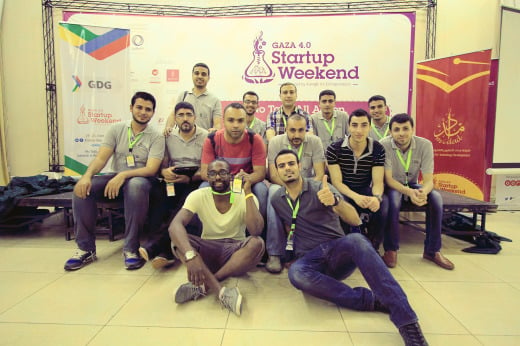
We’re very serious at the same time. Most of Gaza’s economy is based on humanitarian organizations that give grants and handouts. Here at Gaza Sky Geeks, you have to earn your own way. People show up on time and work hard. Not everyone likes how high our standards are – some people complained when we initially invested in only two startups. But for both the short-term and the long-term, we believe we are setting the right standards by keeping them high. People will step up.
From my perspective, Gaza Sky Geeks is the most important part of Gaza. We have built a true startup movement that has the potential not only to change the future of these youth, but also to change the future of the region. In a decade when we’re producing product after product people will look to us as one of the major tech hubs.
The challenges we face
We face challenges all the time because we are Gazan, but we’re used to it. We laugh them off. I know Gazans who have been held at the airport in Cairo for five days. Borders with Israel and Jordan also always take longer for Gazans than other people, even when we have permits. And sometimes we simply can’t get permits to leave Gaza or visas to enter other countries. When I cross a border and pull out my ID card, people raise their eyebrows and say, “Hmm… you’re Gazan? Step to the side for an interview.” My heart always sinks a bit at that moment, though I know it’s just going to take a little extra time. People aren’t used to seeing Gazans travel.
My daughter
One of the most special parts of my life is my daughter. She’s under a year old and she’s just learning to crawl and walk. Her smile always makes me smile. Being a father is one of the most amazing feelings on the face of the planet.
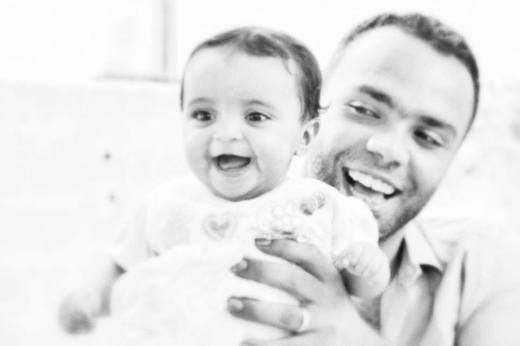
Losing my home in the conflict last summer
The conflict last summer was awful… it was much more difficult than I can possibly describe here. I had always thought that if a conflict happened, it would be like the one in 2012. We have been through a lot and thought we were used to it. But this one was different.
My entire neighborhood was destroyed in the middle of the second week of the conflict. I evacuated my wife and daughter. My mother had passed away the day before the conflict for other causes. I miss her more than I can describe. My father had passed away long ago.
Now that I’ve lost my home and both of my parents, I have nothing that ties me to my childhood in Gaza. It feels odd to be at a point of closure, a point where I have to start anew. I have a job so I was able to rent out a new apartment, but even so, it has been a financial stretch. More than that, though, I miss my home and still feel raw inside about having lost it and the whole neighborhood. And when I evacuated I wasn’t able to take most of my belongings with me. I lost everything.
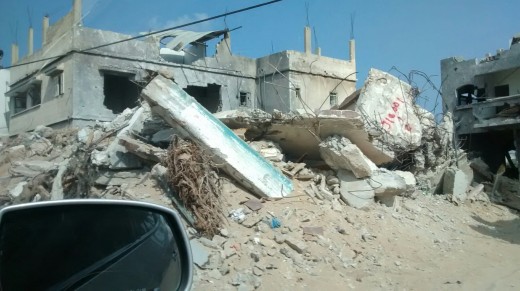
During previous conflicts, my parents were alive and took care of me. This time, I was the father: I have my baby and wife to take care of, and my mother was gone. It was a huge weight, the responsibility… having to figure out what to do each day to stay safe.
This summer, it was never clear where we would be safe. We moved to a friend’s house after my neighborhood was destroyed. It’s in a good neighborhood in Gaza City. But even good neighborhoods were subject to air strikes. Often, people would receive a call telling them to evacuate the building before it was bombed, but not always. I know one colleague from Mercy Corps* who lost over 10 family members – her mother and brother and nephews and nieces – when their apartment was hit. Everyone had gathered to that apartment because they thought it would be the safest one, and then it got hit, with no warning.
We were up every night during the conflict because the bombings were so loud that we couldn’t sleep. We dozed off during the day when it was more quiet. The night that the big buildings were hit in Gaza was the worst. I can’t even describe what it was like. You watch movies, right? Movies of wars? Well, all I can tell you is that no film has been able to capture what it actually looks like. The image, sound, smell and fear can’t be captured in a movie.
* Mercy Corps is the organization that runs Gaza Sky Geeks. It is a global humanitarian organization with decades of experience helping people create better futures in tough places. In Gaza, Mercy Corps employs about 90 people. All except four are Gazan and remained in Gaza during the conflict.
Moving forward with startups
It was hard to focus on my startup and on Gaza Sky Geeks during the conflict. For the most part, I had to keep my wife and baby safe and calm. But I couldn’t stop working entirely. I was in touch with my investor throughout the conflict, and since he’s outside of Gaza, we came up with a Plan B. I also gathered with the other entrepreneurs in Gaza during every ceasefire. We wanted to move forward with our work fast, without too much interruption.
We won’t ever forget those awful seven weeks. I don’t wish violence on anyone. Like most Gazans, my dream is to bring up my daughter (not to mention myself and my startup!) in a stable environment.
After the conflict, it took me a few weeks before I could work at 100% again. It took a while to recover from everything that had happened. But even as I was recovering, my startup and Gaza Sky Geeks is what kept me going. There isn’t much positive stuff happening in Gaza right now – people are all wondering if another conflict will happen again, everyone is talking about what happened. There isn’t stable electricity at home. I need to get away from that and focus on new topics, new conversations, the future.
My startup is doing well. My investor helped me obtain a CTO who has been leading most of the work at this stage. At Gaza Sky Geeks, we have more interest than ever before. This is my mission in Gaza: to create a thriving startup community. This is the part of life that I can influence. This is what has kept me going.
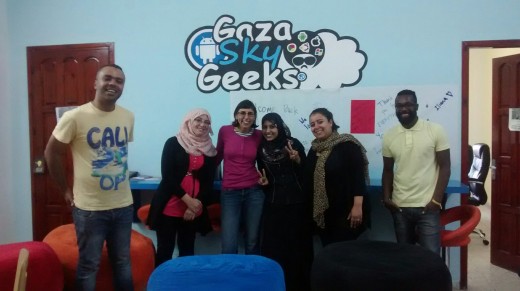
Getting back into the swing of things
It has been about 3 months since the conflict and things are returning to normal, or as much as they can with rubble still all around. Still, we’ve slept better over the past few weeks and are back in the rhythm now. I work about 70-hour weeks, which is the most I can do given that I don’t have electricity all the time at home. I often stay in public places that do have electricity so that I can get more work done.
In November, on my birthday, we ran our event for Global Entrepreneurship Week. We had 90 people squeeze into the space at Gaza Sky Geeks. I had been hoping for 30. I shut down registration after one day of announcing the workshop because there was too much interest. Soon we’re going to need a larger space!

